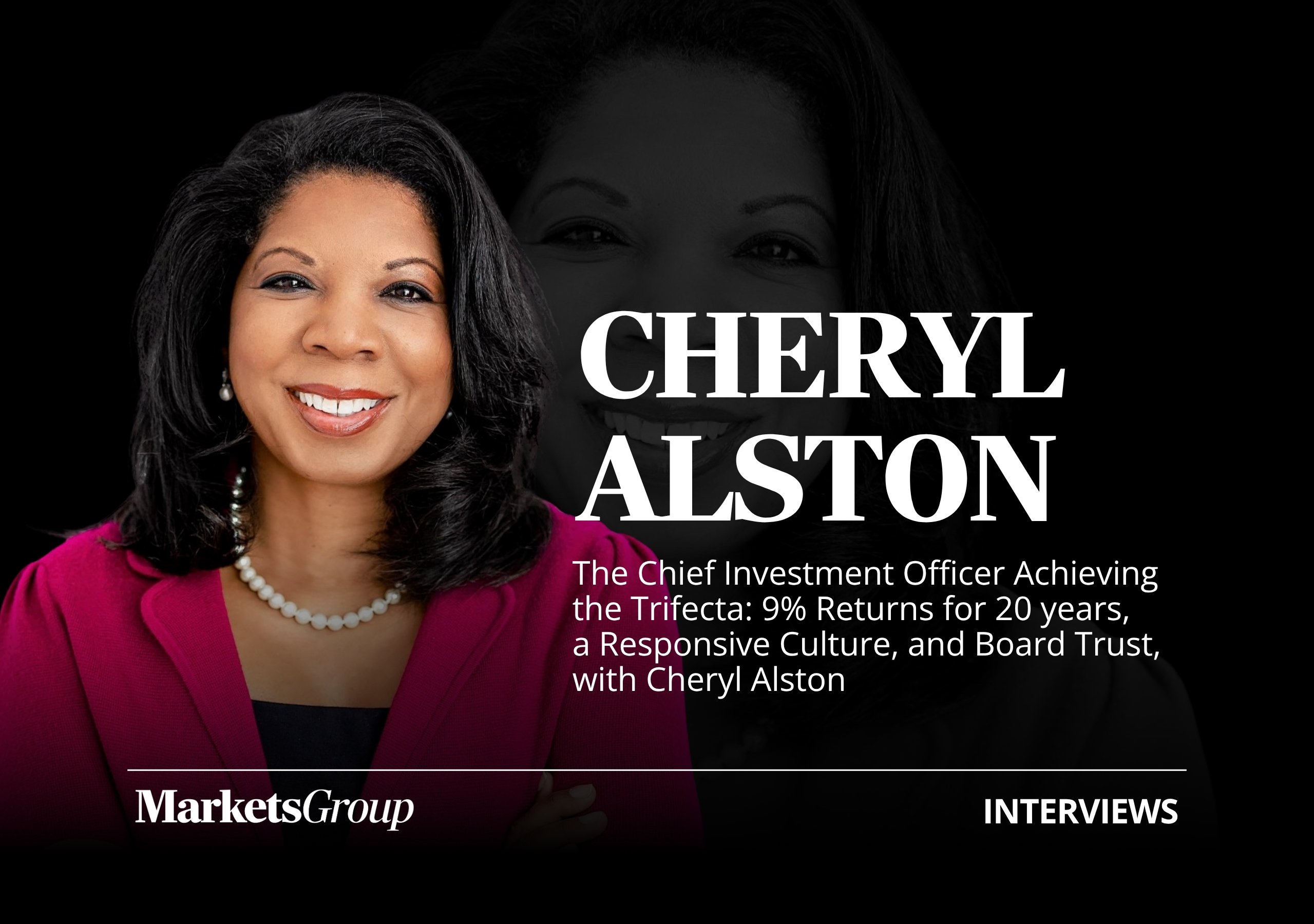During her 20 years as the chief investment officer and executive director of the Dallas Employees Retirement Fund, Cheryl Alston was able to achieve something few others have. In fact, some might call it the trifecta: returns of close to 9% that beat her benchmark by more than 1% over 20 years, board trust, and an investment team culture that was sensitive to the needs of her employees.
Also, a Presidential appointee to the Pension Benefit Guarantee Corporation Advisory Committee, she was able to help thousands of beneficiaries connect to their lost benefits. Known for her strong leadership on a national level and her ability to navigate as both a visionary and sometimes a contrarian, she is known as a solid leader who creates a great culture for the fund to succeed.
Register now for Markets Group’s Institutional Fall Retreat, which will be held Nov. 17-19, 2025
Alston, who recently retired, received a Lifetime Achievement award from Markets Group on October 16 at the 12th Annual Texas Institutional Forum in Austin, during which, her former board chair, Randy Bowman, said “When you’ve seen someone work and commit the way that she has done for the past twenty years… The lives that she has improved, the pensions that she has secured, there’s no way I would not be here to celebrate her.”
Her new CIO Natalie Jenkins Sorrell commented, “She is incredibly worthy of this award and she has done so much for the industry, and people coming up in the industry, like myself.”
During this interview, we discuss what some of her career lessons have been, as well as when she found it best to be a contrarian, how she established the right working culture, and how she created an environment for her fund to score those high returns for 20 years.
Watch / listen to the exclusive video interview below on YouTube:
Transcript of video interview:
Christine Giordano, Markets Group: Welcome, Cheryl Alston.
Cheryl Alston: Thank you so much for having me.
Giordano: Sure. If you don’t mind, let’s start from the top. First of all, what was your career like before you became the CIO and the Executive Director of the City of Dallas?
Alston: Christine, I started out in investment banking. I worked on Wall Street and had the experience of working in the investment banking area, real estate division. I moved on after that to Cigna and worked with their investment group.
Then, about 20 years ago, I moved down to Dallas, Texas, and met a wonderful mentor who told me about the position as Executive Director and Chief Investment Officer. I went to go interview with the board. The board called me before I got home from the interview to tell me I had the job, or offered me the job. That’s the road that led me to my most recent role as Executive Director and CIO.
Giordano: Congratulations on those high returns. 9% over the past 20 years. That’s through recessions, that’s through dips. What were some of the keys to doing that right?
Alston: I think the keys are a few things. One is around being a long-term investor. I think back to the first one, 2008, and talking with the board about just the markets. Everything was going south at that point. One of the things that we realized is that, if you buy quality, it comes back. That was one of the decisions that we made to become active in the secondary market for private equity.
When there were foundations and endowments that had liquidity issues, we decided to go purchase secondaries. We also were paying out exit cues for core real estate. We went and selected some managers. At that point, we felt that, especially for core real estate, that was a really safe bet. We also expanded in high yield at that point.
If you remember, in 2009, I think the high yield return was over 50%. I think having a strong relationship with your board, really thinking as a long-term investor, and thinking about your asset allocation and where you can be opportunistic at that time. With that discussion with the board, we were able to move quickly and take advantage of some of the dislocations in the market.
Giordano: Then, on developing that strong relationship with your board: You’re in an environment where sometimes every indicator in the market is pointing in a certain direction. Every pundit on TV is telling exactly what people should be doing, and yet you’re a contrarian. You’re ready to snatch up what other people are not doing. Let’s get into the weeds on that a little bit. How did you handle that?
Alston: It’s interesting. When I first started, it was a very knowledgeable investor who told me, he said, “Experience does matter.” At first, I was young and I was like, “Yes, yes.” Now I realize, staying calm in these markets, focusing on the data, and focusing on sticking to your core investing principles is what really helps you in the end.
I think also, over the 20 years, we’ve seen several firms that did not do well. Interesting enough, if you stick to your core due diligence principles and don’t get, I say, get caught up in hype, and really focus on the fundamentals.
We were able to see that we were able to not invest in some things that did not go well for many investors. That, as a culture, from a board perspective, thinking strategically, looking long-term, focusing on asset allocation, sticking to our due diligence, is just really, really important.
Giordano: As a past presidential appointee of the PBGC board. Now, this is interesting because that’s usually dealing with corporate funds, if I’m not mistaken. Maybe you can illustrate what your role was there.
Alston: Oh, absolutely. The advisory committee is made up of people that are representing the corporation, and some that are representing the members. I think as an executive director and CIO, I’m always focusing on the members, the retirees, the active members.
I think one of the core principles that we have is making sure that people get what they earned, and then also, from a cost perspective, being as efficient as possible so that it doesn’t cost anyone too much. I don’t want it to cost the city or the voters a lot of money. I don’t want it to cost the corporations or the employees, or retirees.
I think that is the perspective that I brought. During my tenure, what we focused on was obviously the investments and asset allocation. They are absolutely long-term investors. Their philosophy was very different from their members because they needed to do well when the members were not doing well. For example, in 2008, PBGC did extremely well because they are the backstop for the corporations.
For the members, what I was really focused on was making sure that each member received what they earned. I think sometimes, just even changing your mindset from the member having to reach out to you to contact you to reversing that so that the organization reaches out to the members to say, “Oh, guess what? You have a retirement here, and here’s what you need to do in order to receive that retirement, or if you have beneficiaries.”
I think what I brought to the table was true investing experience because I was still an institutional investor. I think also really looking at the lens from the members to make sure that we were creating an efficient organization that honored the mission of the PBGC.
Giordano: You were able to help thousands of members get the benefits that they deserved. You were mentioning how sometimes a member might change jobs, or the company might go out of business, and they’re owed a pension, or they’re owed some funds. They didn’t understand that. How did you–
Alston: They didn’t. I think what was helpful was encouraging the PBGC to– They were doing some outreach, but they could have done more, and so they did. Once we talked about, and they saw– My personal philosophy for Dallas ERF was that if you’re owed funds from the market, we will find you. We will find you. You will find your heirs. We will make sure.
I don’t want the money to sit in the fund if it’s due to someone. Taking that philosophy to a national level to make sure that we’re reaching out to the people because you never know what life situation, health situation they’re going through.
When they find out that they have an opportunity to get a steady income from their retirement that they maybe had forgotten that they had, or they did not think they were going to receive, it’s a huge moment. I know for my staff who was responsible for that, they loved those calls.
The people were so appreciative. They were so thankful. They didn’t know. Now, they sent out some of the happiest moments when they were able to tell people that there is a source of income that they earned.
Giordano: Isn’t that a beautiful call to make? You’re also known for staff development and time management. As a CIO and as an executive director, you’ve been extremely careful to recognize the human in your staff members and perhaps family priorities.
Being able to create a culture that incorporated all of that. It turned out longevity was a big part of that. The staff stayed. Can you talk to me about how you created that and balanced your own schedule at the same time?
Alston: Absolutely. Like I said, just probably like you, I’ve worked in many different corporate environments. I’ve worked in investment banking, where you’ve worked 90 hours a week and you had all four weeks of vacation at the end of the year. I’ve worked in different ones.
What I wanted to create from a culture when I started was what I call results-oriented, life-friendly. Results-oriented, the sense of we have to get all of our work done, our customer service ratings have to be 95% or better in terms of excellence.
From an investment perspective, we have to obviously maximize the investment returns we can in a risk-adjusted way, but in a thoughtful way. However, life-friendly in the sense of, I realize that everyone is a son, a daughter, a mother, a father, and that you should be able to bring your whole self to work.
How I described that is, and I’ve told this when I started with my staff, I said, “Listen, if I schedule a meeting at 11:00 AM and your daughter has a kindergarten Halloween party at 11:00 AM, then you need to come in and tell me that you have a Halloween party.” Then I will move. There’s nothing magical about 11:00.
I will move the meeting because I think that it’s very important for people to be able to make those events. The Halloween party is 45 minutes an hour, but the minute the parent walks in the room, it means the world to the child, and the world to the parent as well. I want them to have those moments and not feel they have to hide that.
With that, another example, I have an IT person who said he wanted to coach his daughter’s team. I said, “All right, well, just adjust your schedule so that you can get out before school ends and so that you can do that.” He can get a job anytime he wants, but he stays because he appreciates having that flexibility. I will say, if anything from an IT issue happens over the weekend, he is the first person there, unasked.
He knows. I think that kind of respect and commitment and bringing your whole self to work, and this was before the pandemic, during the pandemic, post-pandemic, we’ve always had this culture. I think it’s really important.
Because of that, when people leave me, it’s predominantly because retirement. They reach the retirement age, and then that’s worth. I think that what employees want, obviously, is fair compensation. Absolutely. They want to be able to learn and grow in their skill set, grow their soft skills. They want to be able to grow as a person, and they want the flexibility to manage their life.
Giordano: You’re also on a number of corporate boards now, having retired. You’re advising family offices on investments. Can you go into that? A lot of people want to frame their careers in such a way that they’ll be attractive to the corporate board upon retirement. They also want to make it into the C-suite that you did. Can you give us some last career advice for those who are hoping to do all that you’ve done?
Alston: I think a lot of the corporate boards, what they’re looking for are certain skillsets. Either it’s audit, it’s investments, it’s HR, IT. I think whatever your skillset is, really try to get to the highest level in that. For me, obviously, as a chief investment officer, as executive director, they’re also looking for, do you have the skillsets that come in a C-suite?
You see the entire issues of a corporation, how to manage a corporation through different sets and challenges. I would tell people to focus on that. Interestingly enough, the right board will find you in terms of that. That would be my advice, is really focus on your skillset.
Focus on the managerial or strategic skills around that, and then, really, just let people know that you’re interested in serving on a corporate board, a foundation, or endowment. There’s a lot of foundation endowments that I’ve did just really to help them out, especially on the investments side. Just on a volunteer basis, I would help them.
Giordano: Natalie has been at your fund long enough, I’m guessing, to be mentored by you. Now, she is the CIO of the City of Dallas. What are some things that you would like to pass on so that everyone can have that experience of being mentored by their CIO and hopefully becoming the next CIO to that seat?
Alston: I think as a CEO or board member, I always focus on succession planning. That’s one of the things, when I’m sitting in the board seat, I talk to the CEO about a lot, which is what happens. I was in a situation on a board where the person had a major health issue, and they left the next day. Luckily, I was the next in line. I was the deputy, so I was able to step up and do that.
I think, for a lot of the CIOs, focus on succession planning. Natalie, what you may or may not know, I was executive director and CIO. The board split those positions. My deputy director, who’s been with me almost 10 years, he became executive director. His name is David Etheridge. My deputy CIO, which is Natalie Jenkins Sorrell, which you just mentioned, became the CIO.
You have to identify great talent and groom them, and give them the opportunities to show their skills. The best scenario for me, I think, is when you can grow someone, they understand the organization, they understand, and they can move up into that role. That is the best thing I’ve seen. I’ve helped, actually, with corporations and foundation endowments. I’ve helped six CEO transitions.
Sometimes you have to go outside, but most of the time, if you can develop the right people and mentor them and create a pipeline so they move up, somebody has to move into their seat. That, to me, is the best situation for a corporation. If they really focus on true succession planning and identifying and developing people.
Giordano: Beautiful. Thank you so much, Cheryl Alston. This has been a wonderful interview. Congratulations again on your Lifetime Achievement.
Alston: Thank you so much.













